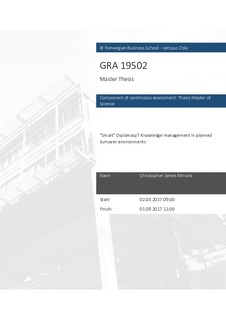"Smart" diplomacy? Knowledge management in planned turnover environments
Master thesis

View/
Date
2017Metadata
Show full item recordCollections
- Master of Science [1621]
Abstract
Modern communication has ended much of traditional diplomacy. As national
leaders and analysts can connect directly with other foreign nations from inside
their own boundaries, embassies and consulates have taken on a new primary task
– export promotion and development of the home nation’s business interests
abroad. This leads to the question: if embassies are taking on business roles, are
they also being run like a business? Billions of tax dollars are spent on diplomatic
programs each year, and citizens deserve effective steering of that money. Those in
charge of these staggering budgets are often diplomats who are rotated to different
work posts throughout the global embassy system every few years. With only two
or three years per rotation, these diplomats receive extensive training and are
expected to hit the ground running in their new rotation. Local knowledge, however,
is vital to understanding how both business promotion and traditional diplomatic
and consular work should be accomplished within the new cultural environment.
With that in mind, this thesis will explore how embassies are managing the
knowledge that comes in and out of their doors. Do these new diplomats have the
benefit to learn from their predecessors? What systems are in place to avoid costly
relearning of local knowledge once a skilled diplomat moves to his or her next post?
Knowledge can be seen as both tacit and explicit, and both are vital to an
organization’s success. To get a full picture of the knowledge management
processes within foreign missions, this thesis will explore both.
Description
Masteroppgave(MSc) in Master of Science in Business, Strategy - Handelshøyskolen BI, 2017